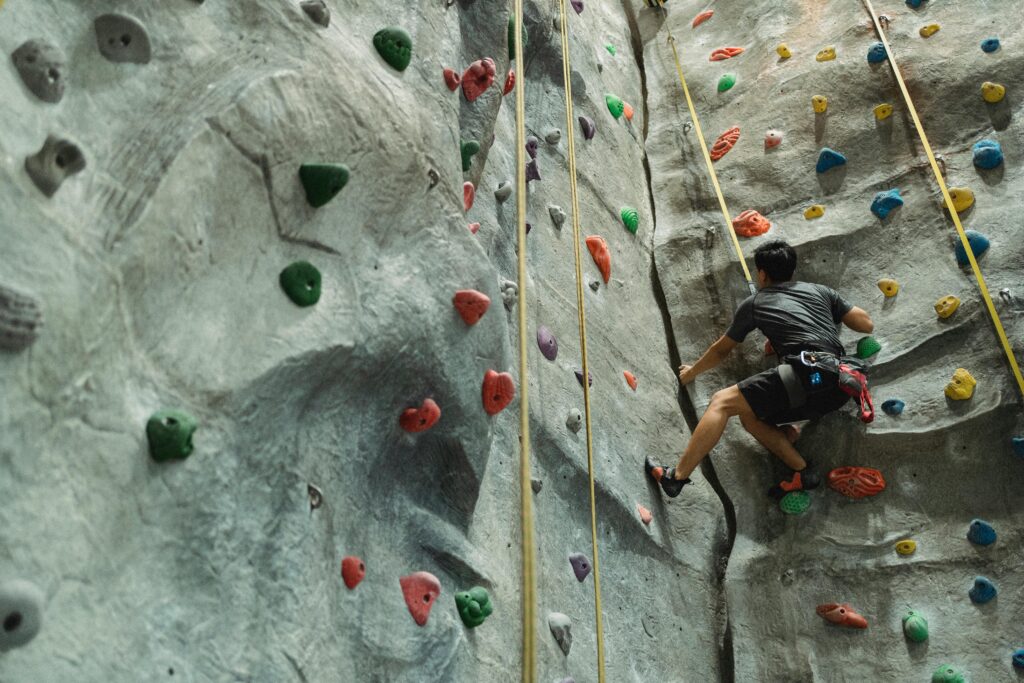/
The Early Days: Indoor Climbing as a Training Tool
Indoor climbing traces its roots to the early 20th century when climbers began looking for ways to train during inclement weather or off-seasons.
- 1900s Beginnings: Early training walls were rudimentary, often made of wood or bricks, designed to mimic outdoor rock features.
- The UK Pioneers: In the 1940s and 1950s, British climbers like Don Robinson developed the first artificial climbing walls at universities to simulate outdoor climbing environments.
1970s: The Birth of the Modern Climbing Gym
The 1970s marked the emergence of purpose-built indoor climbing facilities.
- First Climbing Gym: In 1974, Wolfgang Güllich and others constructed the first modern indoor climbing wall in a gymnasium in Germany, allowing climbers to practice technical moves year-round.
- Bolt-On Holds: The invention of bolt-on holds revolutionized indoor climbing, enabling the creation of customizable routes and a more authentic climbing experience.
1980s: The Indoor Climbing Boom
Indoor climbing gained momentum in the 1980s as gyms began popping up across Europe and North America.
- Commercial Gyms: The first commercial climbing gyms opened in France and the United States, catering to both beginners and seasoned climbers.
- Competitive Climbing: The first indoor climbing competitions were held, setting the stage for sport climbing’s future as a competitive discipline.
- Route Setting: Professional route setters emerged, crafting challenging and creative indoor climbing routes that mimicked outdoor climbs.
1990s: Climbing Gyms as Community Hubs
By the 1990s, indoor climbing had become more than just a training tool—it was a community hub.
- Accessibility: Climbing gyms began focusing on accessibility, offering beginner classes and rental gear.
- Youth Programs: Gyms introduced programs to train young climbers, fostering a new generation of athletes.
- Bouldering Gyms: Dedicated bouldering gyms emerged, providing climbers with a more social and dynamic environment.
2000s: The Rise of Indoor Climbing Culture
The 2000s saw indoor climbing explode in popularity, driven by technological advancements and media exposure.
- High-Tech Walls: Gyms began using materials like fiberglass and 3D molds to create realistic climbing surfaces.
- Climbing Films: Documentaries and climbing media brought attention to the sport, inspiring newcomers.
- Olympic Dreams: The inclusion of sport climbing in the Olympics (announced in 2016 for the 2020 Games) spurred interest in climbing as a competitive sport.
2010s: Indoor Climbing Goes Mainstream
Indoor climbing became a mainstream activity in the 2010s, appealing to fitness enthusiasts, families, and serious climbers alike.
- Rapid Growth: Thousands of climbing gyms opened worldwide, catering to urban populations.
- Advanced Training Tools: Gyms incorporated tools like auto-belays, moonboards, and augmented reality walls to enhance training.
- Inclusivity: Gyms prioritized inclusivity, offering adaptive climbing programs for people with disabilities.
Indoor Climbing in 2025
In 2025, indoor climbing continues to thrive as a sport and lifestyle.
- Technology: Smart climbing walls track performance metrics, and virtual reality climbing experiences are gaining popularity.
- Sustainability: Gyms are adopting eco-friendly practices, such as recycling holds and using sustainable materials.
- Olympic Impact: The success of climbing in the Olympics has driven a surge in youth participation and competitive climbing events.
- Global Community: Indoor climbing remains a unifying force, bringing together climbers of all backgrounds and skill levels.
Final Thoughts
The history of indoor climbing is a story of innovation and community. From its humble beginnings as a training tool to its status as a global phenomenon, indoor climbing has redefined how people engage with the sport. Whether you’re a seasoned climber or a first-timer, stepping into a climbing gym means participating in a vibrant and evolving tradition.


Pingback: How to Start Bouldering in 2025: A Beginner’s Guide - gearyourgrip